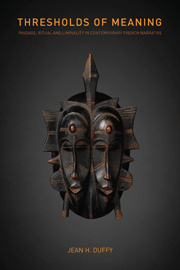Book contents
- Frontmatter
- Contents
- Acknowledgements
- List of illustrations
- Introduction
- 1 At death's door: illness, ritual and liminality in Darrieussecq, Lenoir, and Mauvignier
- 2 Suicide and saving face in Bon, Mauvignier and Bergounioux
- 3 Commemoration, monument and identity in Bergounioux, Darrieussecq and Rouaud
- 4 Retouching the past: family photographs and documents in Rouaud, Bon and Lenoir
- Conclusion: Writing passage and the passage to writing
- Notes
- Select bibliography
- Index
3 - Commemoration, monument and identity in Bergounioux, Darrieussecq and Rouaud
- Frontmatter
- Contents
- Acknowledgements
- List of illustrations
- Introduction
- 1 At death's door: illness, ritual and liminality in Darrieussecq, Lenoir, and Mauvignier
- 2 Suicide and saving face in Bon, Mauvignier and Bergounioux
- 3 Commemoration, monument and identity in Bergounioux, Darrieussecq and Rouaud
- 4 Retouching the past: family photographs and documents in Rouaud, Bon and Lenoir
- Conclusion: Writing passage and the passage to writing
- Notes
- Select bibliography
- Index
Summary
Over the last thirty years, memory and commemoration studies have become one of the fastest developing interdisciplinary fields in the humanities, attracting the attention of, among others, historians, anthropologists, sociologists, literary critics and art-historians. This growth and the dizzying array of publications produced not only reflect what has been variously described as a memory boom, a memory industry, an addiction to memory and, perhaps most graphically, an ‘immersion in memory and its sites [that] may at times have the quality of junk-Proustian Schwärmerei’ (LaCapra, 1998, 8). They also attest to the dynamic, if at times confusing and confused, dialogues taking place across discipline boundaries. Among the most popular subjects addressed one might cite as indicative: the roles of the monument, the archive and the museum; the evolution of concepts such as the patrimonial and generation; the distinction between protomemory and metamemory; symbolic accretion; and the tension between memory and history (see Klein, 2000; Dwyer, 2004). Commentators have attributed the proliferation of forms of commemoration to a range of factors including democratisation and the development of mass culture; the disappearance of peasant culture; globalisation and regionalisation; the emergence of theory and anti-historicist discourses (see Klein, 2000; Foote, 2003 [1997]).
- Type
- Chapter
- Information
- Thresholds of MeaningPassage, Ritual and Liminality in Contemporary French Narrative, pp. 131 - 190Publisher: Liverpool University PressPrint publication year: 2011



